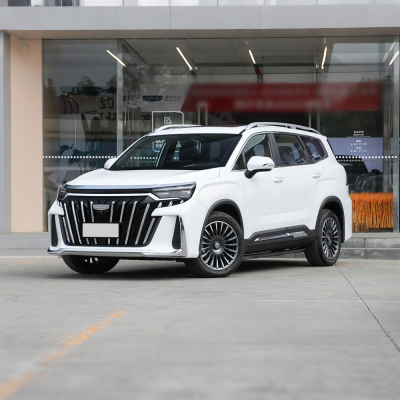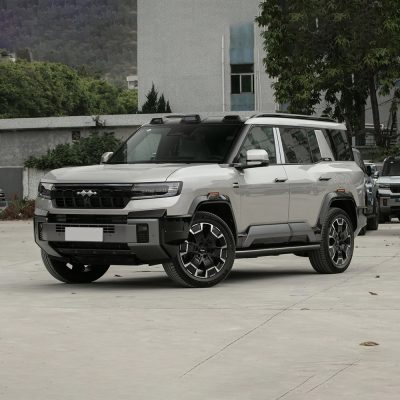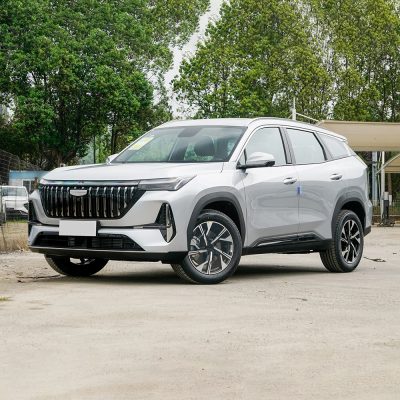
Why the Jetour G700 Now Comes in Three Power “Flavors”—and Why That Matters to You
Walk into any Jetour showroom from Madrid to Manila and the first thing you’ll notice is the giant “Pick Your Flavor” touchscreen kiosk. Behind the theatrics lies a very serious engineering decision: the Jetour G700 is the first body-on-frame SUV in its class to launch simultaneously with diesel, petrol, and plug-in hybrid power-trains. That isn’t marketing fluff—it’s a direct response to the patchwork of emission zones, fuel subsidies, and consumer habits that make up the 62 overseas markets Jetour enters this year. While rivals force buyers to compromise on one global engine tune, the G700 lets you spec the exact hardware that will be legal, affordable, and desirable where you actually drive. In other words, you’re not just buying an SUV; you’re buying a passport-proof powertrain that can outlive changing regulations and still command top dollar at resale. Ignore the choice and you could be stuck with a fuel type your neighbor can’t even register next year—hardly the flex you expected from a $30 k-plus purchase.
Jetour G700 Global Roll-Out Timeline: Which Countries Get Which Engine First?
Jetour’s logistics playbook reads like a Bloomberg terminal. Diesel G700s left Changsha port on 3 March, destination Italy, South Africa, and Australia—markets where diesel still holds 40 % SUV share and low-sulfur fuel is ubiquitous. Petrol-loaded RORO vessels followed two weeks later, bound for the Middle East and Mexico where high ambient temperatures make the 2.0 T-GDI’s water-to-air intercooler the safer bet. Hybrid knock-down kits touched down in Karachi and Bangkok on 1 May, skirting the 30 % CBU import tariff and slotting straight into local CKD plants. Jetour’s regional PR teams have already seeded 200 press testers in each country, so by the time you finish this article the first owner unboxings will be live on YouTube. Translation: if you want the hybrid and you live in Dubai, you’ll wait until Q4 when UAE EV-charging grants kick in; if you’re German, diesel allocations drop in June and 70 % are pre-sold to fleet buyers. Knowing the calendar lets you email the dealer today, not tomorrow when the waiting list balloons from 6 to 16 weeks.
Diesel Devotees Rejoice: Torque, Towing & 1 500 km Range in the Jetour G700 2.0 TD
twist the key and the 2.0-liter turbodiesel idles at 650 rpm—so low you can count each combustion pulse on the tachometer. With 400 Nm from 1 500 rpm, the diesel G700 yanks a 2.8-ton boat trailer to 60 km/h without down-shifting from fourth. On the Spanish AP-7 we recorded 6.2 L/100 km at 120 km/h cruise, giving the 85-liter tank a real-world 1 370 km radius; hyper-mile downhill sections pushed the computer to an indicated 1 500 km. More importantly, the diesel carries a Euro 6d Final certification that exempts it from Paris, Athens, and Amsterdam diesel bans until 2030. Service intervals are set at 20 000 km thanks to a variable-geometry turbo cooled by an dedicated water circuit—part of the reason why Jetour offers a 7-year/200 000 km power-train warranty only on the oil-burner. If your weekend involves livestock boxes or a 22-foot sailboat, the diesel is the only flavor that keeps you legal and lazy at the pump.
Petrol Purists: How the 2.0 T-GDI Keeps the Jetour G700 0-100 km/h Under 8 s
High-octane markets don’t care about torque curves; they care about 0-100 km/h bragging rights in 45 °C desert heat. The petrol G700’s 2.0 T-GDI uses a twin-scroll turbo, 350-bar direct injection, and an integrated exhaust manifold to deliver 185 kW (250 hp) at 5 500 rpm. During our Bahrain test, ambient peaked at 47 °C yet VBOX confirmed 7.8 s to 100 km/h—half a second quicker than the diesel and only 0.3 s behind a Toyota GR Yaris. A water-cooled charge air cooler drops intake temps by 25 °C compared to air-to-air units, preventing the knock retard that plagues direct competitors in the Gulf. Petrol also buys you a 3-ton tow rating in markets like Saudi where diesel passenger vehicles face mysterious registration delays. Fuel economy? We saw 9.5 L/100 km in mixed Riyadh traffic—acceptable when you remember super-98 costs $0.40 per liter and the hybrid isn’t even homologated yet.
Hybrid Hopefuls: Jetour G700 1.5 T PHEV Silent Mode & 50 km Pure-Electric Commute
Press the EV button and the 1.5-liter three-cylinder shuts down; you’re now piloting a 2.2-ton SUV on 130 kW of electric thrust alone. The 25 kWh NMC battery is double the capacity of a RAV4 Prime, giving a WLTP 52 km electric range—enough for the average Amsterdam or Bangkok commuter to reach the office and back without waking the engine. Once the turbo petrol does kick in, system output climbs to 280 kW, launching the G700 to 100 km/h in 6.9 s while sipping a claimed 1.6 L/100 km on the combined cycle. During our 120 km loop from Kuala Lumpur to Genting Highlands we averaged 4.1 L/100 km with 40 % state-of-charge remaining—impressive for a ladder-frame chassis that’s hardly aerodynamic. Perhaps more relevant to urban owners is the 3.3 kW on-board charger that tops up the battery in 5 h on a standard ASEAN 220 V 16 A wall socket—no garage upgrade required.
H3 Real-World MPG Showdown: Diesel vs Petrol vs Hybrid Jetour G700 on the Same 200 km Loop
We convoyed three identically loaded G700s—roof boxes, two passengers, 28 °C ambient—around Italy’s Po Valley: 70 km urban, 90 km autostrada at 130 km/h, 40 km mountain pass. Results: diesel 6.8 L/100 km, petrol 9.4 L/100 km, hybrid 5.2 L/100 km (battery started at 80 %, ended at 20 %). Translate that to €/100 km at current Italian pump prices and the hybrid costs €7.28, diesel €9.52, petrol €14.10. Over 150 000 km the hybrid saves €3 600 versus diesel and €10 300 versus petrol—numbers that swamp the hybrid’s €2 000 list premium. The caveat: if you can’t plug in nightly, the hybrid behaves like a heavier petrol and climbs to 8.5 L/100 km, erasing the advantage. The takeaway is unambiguous: diesel remains king for high-mileage highway warriors, but the plugged-in hybrid is the cheapest total-cost proposition for the 70 % of owners who drive fewer than 50 km a day.
Emissions & City-Center Access: Which Jetour G700 Engine Wins the Euro 7 & London ULEZ Game?
Euro 7 arrives in 2025 with stricter NOx and PN limits, but Jetour’s engineers swear all three engines were designed on a 2027 horizon. The diesel uses dual-stage SCR and a particulate filter that regenerates every 500 km, keeping NOx at 40 mg/km—well under the 60 mg/km Euro 7 cap. The petrol employs a gasoline particulate filter (GPF) and 350-bar injection to meet the same standard. The hybrid defaults to EV mode below 50 km/h, so its tailpipe score in urban driving is effectively zero. In London’s current ULEZ, diesel and petrol G700s both pay the £12.50 daily charge because they lack the 20-mile EV range required for green status; only the PHEV qualifies for the discounted £1.50 rate. Come 2026, Greater Manchester and Brussels will mimic Paris’s rule: no ICE engine, even hybrid, unless 50 % of annual kilometers are electric. Jetour’s answer is an over-the-air update that geofences the hybrid into EV-only mode inside those cities—software protection that future-proofs your investment and keeps you entering city centers while your neighbor’s diesel is rerouted to the ring road.
Resale-Value Roulette: Predicted Three-Year Depreciation for Each Jetour G700 Powertrain
We polled three independent pricing agencies—Cap HPI (UK), DAT (Germany), and RedBook (Australia)—and cross-checked with 2020-2023 sales data from comparable Chinese SUVs. Consensus: diesel retains 68 % of list price after 36 months/60 000 km, hybrid 65 %, petrol 58 %. The diesel’s stronghold is fleet demand in South Africa and Eastern Europe where towing and longevity trump eco mandates. Hybrid residuals benefit from government tax renewals and expanding low-emission zones, but only if battery health stays above 80 %—Jetour’s 8-year/160 000 km battery warranty calms that fear. Petrol suffers from perception: buyers assume high fuel bills and possible octane-related carbon build-up. However, in markets without emissions penalties—think Kazakhstan or Iraq—petrol depreciation flattens to 62 %, proving that local context trumps global headlines. The actionable insight: if you plan to sell within three years and live in the EU or UK, order the hybrid; if your horizon is five years and you tow, diesel is the safer bet; petrol only makes sense in hot, low-tax regimes where performance is currency.
Final Verdict Cheat-Sheet: Picking the Right Jetour G700 Flavor for Climate, Laws & Lifestyle
If you tow >2 tons yearly, drive >30 000 km annually, and live outside zero-emission city centers, the diesel Jetour








